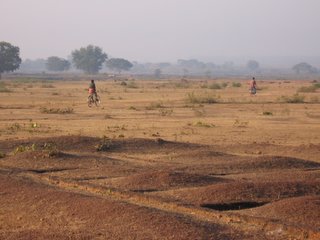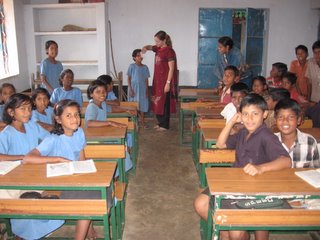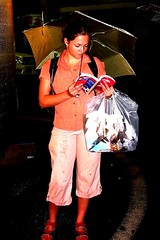Note: For at least the first week of my placement, I’m based in the middle of nowhere… so although I was bragging about my ability to find internet anywhere, anytime, it looks like that won’t be the case. Instead, I’m keeping a journal on pen & paper or the office computer and will upload the entries whenever I find an internet connection.
Jan 31
5:00 pm
From the Director’s office laptop in Bhubaneswar
I had expected my trip here to be more of a hassle. When I booked my flight with Aeroflot Russian Airlines, it was against the advice of not only my travel agent ("they have bad service, yes"), but also a random, muttering Indian man I'd met at the Toronto Indian Consulate in December. According to this guy, I'd be lucky if I didn't end up sitting next to someone who chain-smoked for the whole 20+ hour voyage.
-"But I thought all flights nowadays are non-smoking?"
-"Yes but believe me, on Russian Airlines it's the pilot who gets to decide."
I decided not to believe him, since (a) our conversation had begun when he'd swivelled towards me while mid-sentence in conversation with the other stranger on his left, apparently cutting his losses and looking for a fresh audience for his rambling, and (b) his other stories included some garbled nonsense about his kitchen tap. Legitimate warnings or not, I booked Aeroflot Russian Airlines with the justification that as a student I would embrace both the cheap price AND any bad service/smokers/delays/or adventures that came along.
Surprisingly, or fortunately, the flight was awesome. They didn't have movies but I slept the whole way anyways (thanks to the inflatable neck pillow from Tom's dad); the food was fine (no borscht); I got to chat with a woman from Siberia; the layover in Moscow allowed me to actually see some real snow for a change; and the airline didn't even lose my luggage! The only 'bad service' was some fighting between the Russian stewardesses and various Indian passengers who didn't like to stow their carry-on suitcases in the overhead compartments, or remain seated after landing.
Stewardess: "You must poot eet een the stowage."
Indian woman: -blank stare
Stewardess: "You must poot eet een the stowage."
Indian woman: -another blank stare
Stewardess: "You must poot eet een the stowage."
Indian woman: -still another blank stare
Stewardess: "Do you not understand me?"
Indian woman’s husband: -grabbing suitcase in a huff “I understand you perfectly... don't you have other people to attend to?"
The only other incidents were a couple late take-offs, with didn't bother me since the only things I was late for were various multi-houred layovers in different airports.
After 21 hours sitting on planes and in waiting areas, I arrived in Delhi at 2 am. My final leg of the trip: sitting in the Delhi airport for 6 more hours until I could phone and meet my travel agent, grab a return taxi ride downtown to chat with him about train schedules and travel itineraries (for March), and then hop on Indian Airlines for a short flight across to Bhubaneswar in the afternoon (during which I finished drafting this post).
The first 4 hours in Delhi between 2 am and 6 am went nicely, sitting with a book inside the peaceful sanctuary of Baggage Claim during its dead hours. When I finally got restless, I decided I should head through Customs and brave the taxis, money changers and telephone system. Turns out Customs itself needed the most bravery. Three agents immediately descended on my luggage, possibly because one was a giant clear plastic Rubbermaid container filled with 650 pairs of brand new sunglasses.
What were these for? Was I selling them? I was donating them to poor people? Where was the documentation? Why did my documentation letter say 'the gift is sealed legally for donation'? There were no such seals on the box, see?
They told me I needed documentation from an Indian organization, not an American one. They told me I would have to pay large taxes, or leave the glasses there, or go to an office later that day to apply for an extension, and that the extension would take 3-4 days. (I was flying across the country the same afternoon.) Then they started trying on pairs (and I think quietly approving of their stylishness), and noticed old price tags. Why was I donating them when the tag said $24?? After trying my best to get information and figure out if there was anything I could do (talk to someone? Phone the NGO in Bhubaneswar? Remove all the offending price tags?), I finally burst into tears. At this point, the man in charge suddenly waved me through the Customs gate. As I tried to say "don't mind me... I didn't want to cause trouble... I'm really sorry...", they pushed me through with my crate of sunglasses. I guess all you have to do to get into India with sketchy goods is look really pitiful. But for any future UFS volunteers, if crying doesn't work, I'd say definitely try bribery - with some of those damn fashionable glasses.
The rest of the day went smoothly. India is awesome. More later.
alyss.
P.S. There’s a pigeon doing courtship vocalizations on the windowsill outside. Makes me feel slightly at home.
Feb 1
2:00 pm
NYSASDRI’s Santhasara Campus
It’s Day 1 and I’m already faced with some tough decisions. What I’d expected to do here was vision screening, eye health education, and help out in the eye hospital. It turns out that in my four weeks here, the directors of NYSASDRI (the local NGO that Unite For Sight hooked me up with) have ambition plans for me to visit five locations and investigate and report on no fewer than eight separate development programs which they run. Not only do I hate report-writing, but I was looking forward to lots of hands-on interaction and helping directly rather than observing and information-gathering. However, I think it would be an incredibly valuable experience to see what goes on in the various areas of developmental work here, not just limited to health care. NYSASDRI’s programs include women’s self-help groups and economic collectives, non-formal education programs (“Joyful Education”) both for children and for adult literacy, agricultural demonstration plots and irrigation construction, a joint public/private hospital, the eye hospital, a sponsorship program for the elderly, a family counselling centre, and a shelter for destitute women. I’m not exactly sure how useful they expect my reports to be, given my limited time and the sizable communication barrier (I find it really hard to understand even the English-speakers!), but I’m tempted to trust their judgement and consider it. It’s time to sit down and think hard about what I want to get out of this volunteership and what I can offer.
Feb 1
5:30 pm
Santhasara campus
Back to this language barrier issue. My Hindi tutor/squash partner Namrata asked me before I left if I was good at interpreting the Indian English accent. I told her I didn’t know, but I was sure I would adjust quickly. That definitely hasn’t happened yet. I’ve been alternating between open embarrassment when I constantly ask people to repeat themselves, and hidden embarrassment when I play along and pretend I can understand the more advanced English speakers’ rapid-fire sentences that end up sounding like Oriya anyways. (Oriya is the local language, of which I now know 9 words/phrases!) I’m hoping I’m still in the adjustment stage (it IS only the second day), and that in 6 weeks I’ll come home an expert in interpretation of even the strongest Indian accents. For now, I’m focusing on identifying the differences between Canadian and Indian pronounciation – for example, I asked, “how do you say, ‘I’m full’?”, and my coordinator Dhiren looked confused for a while until he said, “oh, you mean, how do you say ‘you’re pool’?” – so I will probably also come home an expert in imitation.
Feb 2
There’s a dog outside my window that sounds like a cross between a squeaky door and a crow. It’s very young and doesn’t have a mother. Looks like nature’s played a cruel imprinting joke on the little guy.
Feb 4
10:30 am
Santhasara Campus
The campus I’m staying at is lovely, if isolated. There are flowers everywhere, trees of every sort (teak, mango, jackfruit, and lots I don’t know – quite the arboretum), buildings with red and yellow walls, and small plots of corn, cabbage, green onion…
It’s also a total oasis. On my first morning I peeked over a wall surrounding the teak forest and saw only plains of dusty earth with a few shrubs disappearing in the distance into some trick of the early morning light. Yesterday I went walking outside the campus walls and did a loop around the perimeter, about 1 km in total. It’s dry plains practically the whole way around. On one side there is a quasi forest, but it has only large old trees spaced widely apart with no understory or other growth at all, only bare, hard earth. Old women and men from nearby villages spend their days sweeping the fallen leaves into piles, to gather into sacks and use as fuel for their cooking fires. Their backs are in pretty rough shape.
There are villages all around, judging from the chanting and singing I hear early every morning from all directions across the plains. I’ve visited the nearest one, which consists of thatched clay huts and smells of pungent smoke. For some reason it surprised me when a girl pulled out a cell phone. However, she said it’s usually hard to get a connection.
We also have difficulty with the electricity supply – it’s been out more than a third of the time. The landline phones are fine but I don’t have a calling card yet, and haven’t been able to email the number to Tom and my parents yet. I’ll ask if I can get a quick hookup today through the phoneline. That is, if the power doesn’t cut out again. Oh wait, the power storage device under my desk has started beeping again. Looks like it’s gone again until who-knows-when.
Feb 6
10:30 am
Santhasara Campus
I'm lonely. I try to pretend I'm not but there it is. I just heard that my parents called the main office and will try to call here sometime today, and I just about cried. But I'm staying busy (report-writing day!) so hopefully I'll kick this loneliness thing soon! Miss you all.
love
alyss.







